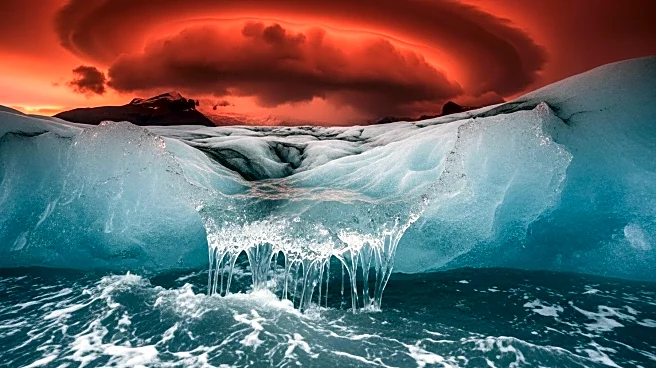What's Happening?
A study from UC Riverside suggests that current global warming trends could eventually lead to a future ice age. The research builds on models of rock weathering and ocean carbon cycles, indicating that Earth's climate system might overshoot its regulation, resulting in dramatic cooling. Historically, Earth's climate has shifted between periods of extreme warmth and glacial epochs, driven by geological processes such as rock weathering. This process absorbs carbon dioxide from the atmosphere, acting as a natural thermostat. However, the study highlights that this system is not as reliable as previously thought, and human activities are accelerating climate changes at a pace that could disrupt natural cycles.
Why It's Important?
The findings underscore the urgent need to address current warming trends, as the accelerated pace of climate change could lead to unpredictable shifts in Earth's climate. Human activities, particularly the burning of fossil fuels, have increased atmospheric CO2 levels, driving rapid warming. This could alter the timing of the next ice age, posing challenges for future generations. The study emphasizes the importance of understanding feedback loops in climate predictions, as these natural stabilizers may become less reliable due to human impact. The potential for a cooling period adds complexity to the already critical issue of global warming.
What's Next?
The study calls for immediate action to limit ongoing warming, as the natural cooling processes may not occur quickly enough to mitigate current climate challenges. Scientists aim to refine models that integrate both slow, natural processes and rapid, human-driven changes to better predict long-term climate consequences. The research suggests that Earth's climate could swing from one extreme to another with little warning, highlighting the need for proactive measures to manage current warming trends.
Beyond the Headlines
The study raises ethical considerations about the responsibility to act on climate change to protect future generations. It also highlights the potential for long-term shifts in Earth's climate system, which could have profound impacts on global ecosystems and human societies. Understanding these dynamics is crucial for developing effective climate policies and strategies.









